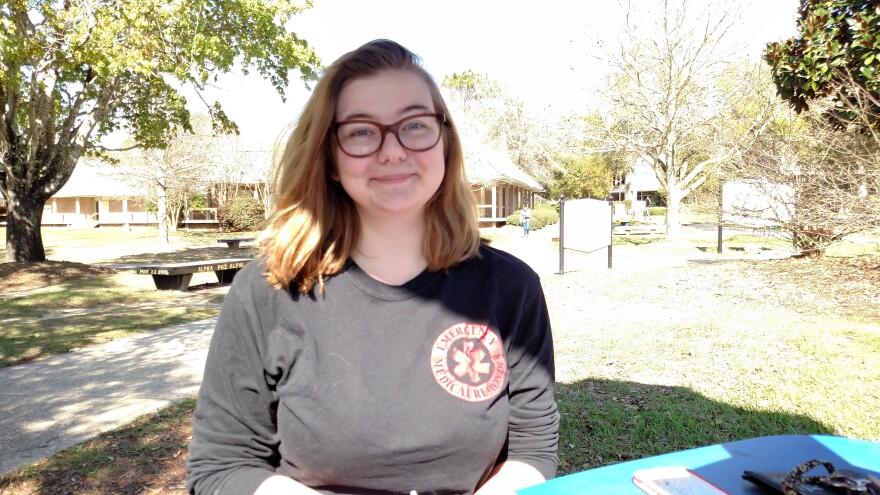One of the worst chapters in the history of The University of West Florida closed last week with the execution of Eric Branch for the 1993 murder of student Susan Morris.
In the years since, active shooter incidents since have forced changes in university safety practices, but it was Morris’ death that triggered the first major reform of campus security.
At the time, some 25 years ago, UWF was still early in its development, with about 6,700 degree-seeking students and lots of green space.
David Faircloth is now interim assistant chief of the UWF Police Department. In January of 1993, he was just launching his law enforcement career on campus, initially hired months before as a full-time dispatcher.
“Then in December of 1992 I was hired as a police officer, but I had to continue in dispatching for a few weeks until they could fill the dispatch position,” recalled Faircloth. “I took the initial phone call from Susan Morris’ family and the complaint was that she had not returned home from class the previous night.”
The body of 21-year old Susan Morris was found the next day.
It was just one week ago, on February 22, that the man who attacked her was put to death by lethal injection. Before his execution, Branch had spent more than two decades on Florida’s Death Row.
“I think the closure is good, for the family (and) for the campus. It took a while, you know 25 years is a long time, but we do have closure now.”
Faircloth says the awful event made a lasting impression on him as a police officer and prompted a series of safety enhancements on campus.
“Immediately after the incident, the university police department was funded for more police officers; we hired more police officers,” Faircloth said, adding that the police department also handled parking services and was able to hire more students to work those jobs and provide safety escorts.
The “Just Two It” campaign was initiated after Morris was killed. Also, the university launched an effort to increase and improve lighting across the sprawling campus and formed a Lighting Safety Survey Committee to ensure the issue is addressed on a continual basis

“You know, twice a semester, the committee goes around on golf carts and we look for dark spaces on campus and we make recommendations for improving lighting on campus,” Faircloth explained. They could point out maybe areas that need trimming to allow the light to shine through more or make recommendations for additional lighting on campus.
Further, Faircloth points to the emergency Blue Lights system. Back in the 1990s, an early version existed, with a relative few of the emergency boxes available.
Now, there are sixty-five Blue Lights scattered across the campus, “And, anyone on campus can use these Blue Lights to contact the university police department and they’ll speak live with one of our dispatchers and the dispatch will send a police unit out.”
“Then today, unlike in the early 90’s we have smart phones,” said UWF President Martha Saunders. The phones are now part of the university’s comprehensive emergency notification system, providing a tool for rapid two-way communication across a variety of platforms.
“We have a text-messaging alert system that notifies the campus community during a crisis situation,” said Saunders, pointing out that all students, faculty and staff are enrolled in that program and have the option of adding their parents or spouses or family members, which she says she has done.
Dr. Saunders is now University President, but she launched her academic career at UWF in the mid 1980’s. She was a faculty member in Communication Arts when Susan Morris, a “Comm Arts” student, was attacked going to her car after a night class in January of 1993.
The incident ignited a major move to improve campus safety.
But, in the years since, Saunders says there’s also been a lot to learn about from different kinds of tragic events, elsewhere.
“The world has just gotten to be a scary place, as we know just in the recent weeks, right here in Florida,” Saunders proclaimed in reference to the mass shooting on Feb. 14 at Marjory Stoneman Douglas High School, where 17 people were killed. Columbine occurred in 1999; Virginia Tech in 2007.
In response to such events, the university has formed a Campus CARE team to assess threats and offer intervention and routinely conducts drills for active shooters, severe weather and other emergencies.
But, when it comes to personal safety, Saunders says some of the best precautions are the simplest.
“There’s safety in numbers, pay attention to your surroundings, or as my dad use to say every time I left the house, watch what you’re doing,” said President Saunders.

That basic message is at the core of a safety briefing for all incoming students at UWF. Combined with security measures, students and others should be able to navigate university grounds, day or night, without fear.
“I feel safe on campus,” said Deanna Hanley, a 20-year-old sophomore studying art history.
"They have those poles (Blue Lights) there, where you just open the box or if you hit it really hard, the police will be notified. And, then I know I have the campus police number on my phone, so I know I can call them whenever.”
“I feel very comfortable with the security on campus and the security of people on this campus,” said Assistant Chief David Faircloth, adding that the campus has come a long way since 1993 and he expects it will continue to improve. “I know that safety and security is high on the list of the university administration, and of course it is for the police department; that’s what we do.”
For more information about campus safety initiatives and programs, go online to the UWF Police Department web site.






